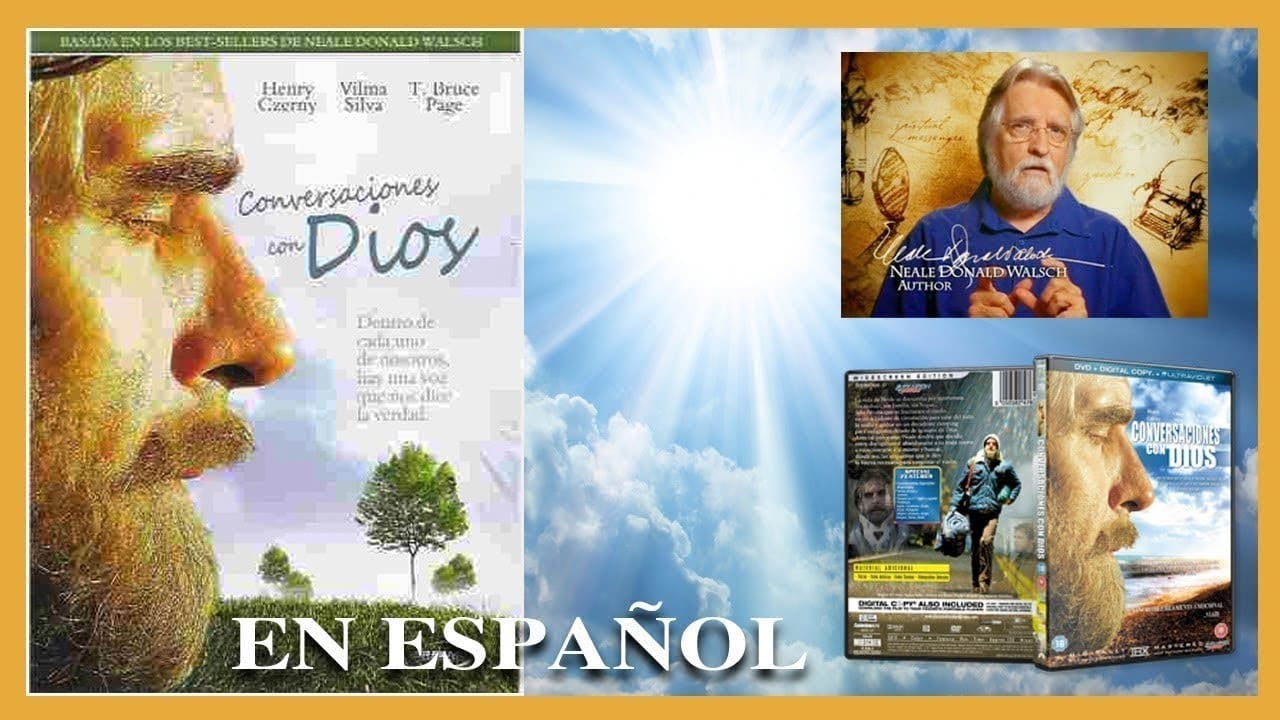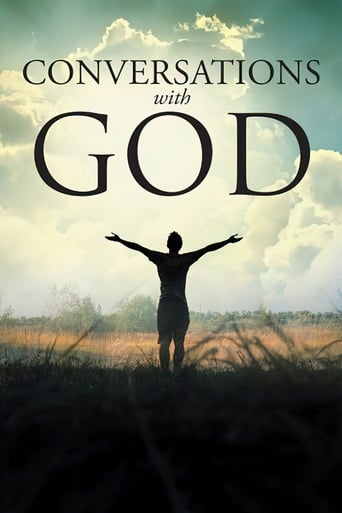

Sadly Over-hyped
... View MoreReally Surprised!
... View MoreAm I Missing Something?
... View MoreStrong acting helps the film overcome an uncertain premise and create characters that hold our attention absolutely.
... View MoreThis movie was good - thought provoking, touching and inspiring. I really liked it however i acknowledge that it will divide people - it's really for those who've read the book and respond to the authors message. If you relate to this and are interested in knowing more about Neale Donald Walsch's story, there's a good chance you'll be pleasantly surprised by this movie. I was. I thought it was well put together, gave due attention to the different parts of the authors story, didn't play him out to be some savior or evangelist and wasn't sugar coated. I don't agree with the infomercial comments, and I'm Australian and we have little tolerance for infomercials and cheesy sales pitches. Obviously its not a big budget movie and its more about the story and the message for those that hear it.
... View MoreHaving read and enjoyed the first three "Conversations with God" books, I was fully prepared to enjoy the movie as well. Although I gave it a 5 star perfect rating, I am fully prepared to accept the fact that many people will not have the same love for the film as I do. It is somewhat slow paced and there isn't much action in the movie. It deals mainly with the background details of Neale Donald Walsch, who after suffering from a broken neck after a car accident, soon loses his job as well as his home and becomes a homeless person scavenging for food and recyclables while living in a tent in a park. Things keep going badly for the soon to be published author as he finds a job only to have the business go bankrupt soon after. He is awakened one night by a voice in his head asking him if he had had enough yet. The voice sounds just like his voice and he is chagrined to learn the voice is coming from his head. He is even more shocked to find the voice is saying that it is God that Walsch is hearing. He grabs a nearby notepad and begins transcribing what he is hearing. This becomes the book, "Conversations with God," which is initially rejected by the publishing firm he contacts. The movie is a sincere, devout movie that I predict will totally upset traditional, mainstream churches and temples. Walsch's "God" is a modern God who is neither vengeful or angry, who seeks to teach Walsch about love and compassion rather than obeying rules and dishing out punishments. God speaks in such a way to sound reasonable, humorous, and more like a good friend than a strict father figure. If you liked the books, you'll love this adaptation as well. If you are not interested in matters of the spirit you might want to ignore this film. Well acted, directed and edited. A must-see for anyone interested in matters of the soul and what it means to be human.
... View MoreThis Christian had to force himself to watch what was otherwise a poorly acted, turgid film so riddled with holes it was laughable--just to see what all the fuss was about. The answer: A quest for a sugar-coated spirituality in which we make God in our image. Every 45 seconds, it seemed, we were sledge-hammered with another psycho-babble-larded lecture about self-fulfillment. Consider, for instance, the theology of money presented in this film: It's phony and self- serving. Early in the film Walsch asks why the people who give the most to the world don't receive the most $$$$. Fair enough; who wouldn't agree? But it's a setup to paper over the bankruptcy of the much later scene in which his agent arm-twists another half-million out of his publisher. Question: If the writer had become so connected to God, why did he sit so quietly during the extortion scene? For that matter, why didn't he give his advice away for free, as, say, Jesus did? In fact, that was my biggest problem with the movie: I found nothing likable about the main character (or the others, for that matter, who came across as codependent losers). By the time he got around to distributing those fat cash-packed envelopes, he had lost me. This movie purports to convey that God is with you in your worst moments and will help you lift yourself up. That's a message worth telling over and over. But the real message that comes across is that there are big bucks to be made in spouting clichés about self-development and easy answers for life's most difficult questions (such as, Why did my son die in a motorcycle accident?) Having survived the movie, I think I'll pass on Walsch's books and watered-down spirituality, and stick to Jesus and the breaking of bread, not the making of ($$$), for my connection with God.
... View MoreFor the millions of readers of Neale Donald Walsch's superb trilogy, "Conversations with God" and his sequel, "Tomorrow's God," this film might have special meaning. It chronicles in dramatic form, highlights from Author Walsch's rise from a struggling wannabe to a best-selling writer. I've no idea how much of this is fact and how much dramatic license that Scriptor Eric DelaBarre took in fashioning his screenplay. However, I'm sure that structurally he spent too much time with Neale's rags and not enough with the transition to riches.For over an hour our hero struggles bitterly, becoming an outcast homeless person. Then rather abruptly he's getting his writing inspiration and turning into a great success. This imbalance is probably because Eric saw the poverty part as more dramatic and emotion-driven.Still, for those unfamiliar with Walsch and his writings, the movie may come off as not too interesting. Only when one is familiar with the writing product (for myself, the books should be included in "Great Books of the Western World" Series) that the bio takes on special meaning.Fortunately, fine Canadian actor Henry Czerny is cast in the lead role. (Who can forget his mesmerizing performance in "Boys of St. Vincent"?) Yet, Czerny can't save the tedium of DelaBarre's script.As for the film title, it has little to do with the book per se (how can one make a film of a book that consists entirely of dialog . . . Qs&As?).In the end, it's appropriate that the film be judged as film and, according to that criteria, it deserves a less that satisfactory rating.
... View More